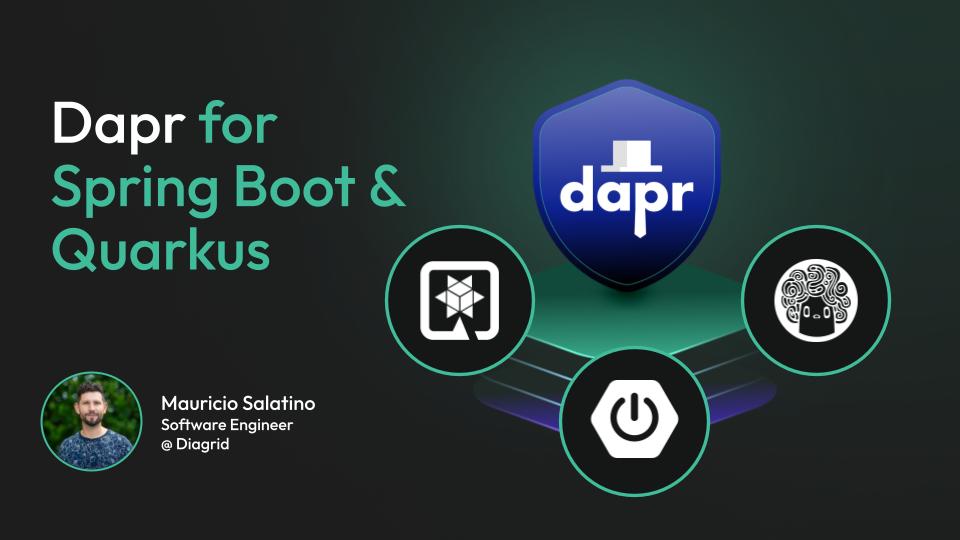Apr 15, 2025
Dapr in 2025: Durable Execution for AgenticAI System
In their KubeCon Europe 2025 session, Yaron Schneider and Roberto Rodriguez explored the cutting-edge features of Dapr (Distributed Application Runtime) that empower developers to build agentic AI systems—AI-driven workflows that operate autonomously, adapt dynamically, and interact securely across distributed systems.
Project Updates and Adoption
- Dapr graduated as a CNCF project in November 2024, marking its maturity and broad adoption.
- Rapid growth: ~700K Docker pulls/month, 8K+ Discord members, and widespread enterprise use (e.g., NASA on the ISS and Grafana’s secure supply chain).
- Strong growth in AI-focused SDKs (Python +151% YoY), driven by AI and agent workloads.
Key New Capabilities for Agentic AI Systems
1. Conversation API for LLM Integration
- Secure and policy-driven access to LLMs.
- Built-in features: circuit breakers, retries, timeouts, auth layers, and sensitive data redaction.
- Local prompt caching reduces latency and cloud costs.
2. Durable Workflows (Now GA)
- Core to Dapr’s agentic capabilities, enabling:
- Task chaining (sequential logic)
- Fan-in/fan-out (parallelism with granular retry logic)
- Timers & monitors (durable long-lived operations)
- Human/agent-in-the-loop support
- Suitable for everything from AI agents to Kubernetes-like controllers.
Agentic Workflows vs Traditional Workflows
- Traditional workflows: structured, deterministic, repeatable.
- Agentic workflows: adaptive, reasoning-driven, and often unpredictable.
- Challenge: ensuring reliability, resiliency, and zero-trust security across dynamically evolving, autonomous agents.
Introducing Dapr Agents
A new agentic AI framework built on top of Dapr workflows, contributed by Roberto Rodriguez and now part of the core Dapr ecosystem.
Features:
- Unified model for multi-agent collaboration.
- Full use of Dapr APIs: pub/sub, state, actors, secrets, and bindings.
- Durable execution even with thousands of concurrent agents.
- Agent logic defined as tasks with decorators in Python; LLMs used for reasoning.
- Support for tool calling, iterative planning, and autonomous orchestration.
Architecture & Patterns
- Orchestrator agent manages the plan and distributes tasks.
- Assistant agents act on tasks, return results, suggest tools, or execute them.
- Communication handled via Dapr’s pub/sub and state APIs.
- Agentic patterns implemented using Dapr’s durable primitives (e.g., ContinueAsNew).
- Demo scenario: “Taking the Ring to Mordor” with agents like Gandalf and Frodo.
Security, Scalability, and Cost Efficiency
- Agents modeled as microservices with isolated state and communication.
- Full lifecycle durability, low-latency local caching, and efficient resource use (e.g., 1000s of agents on a few cores).
- Supports evolving patterns like agent swarms and decentralized reasoning.
Try out Dapr Agents and join the community on Discord to explore use cases and contribute.
Links:
- Presentation Video
- Dapr GitHub
- Dapr Agents Repo (demo & quickstart included)
More videos

No items found.
Jul 29, 2025
This is some text inside of a div block.
Déployer un microservice à travers différents Cloud? Découvrez Dapr
Hajed Khlifi et Jérémy Albrecht partagent lors des Voxxed Days Luxembourg, leur retour d'expérience sur Dapr une solution open source de la CNCF qui réduit la complexité des architectures de microservices et assure leur portabilité entre les environnements on-premise et multicloud.
%20(1).png)
Sep 25, 2024
This is some text inside of a div block.
Introducing Diagrid Catalyst
Now in public beta, Diagrid Catalyst provides a set of developer APIs for building microservice apps, powered by Dapr. Stop hacking together fragmented libraries get back to building, with security and reliability out of the box!




